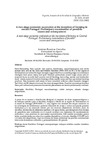Identificador persistente para citar o vincular este elemento:
https://accedacris.ulpgc.es/handle/10553/15005
| Campo DC | Valor | idioma |
|---|---|---|
| dc.contributor.author | Carvalho, António Faustino | es |
| dc.date.accessioned | 2015-11-18T03:31:05Z | - |
| dc.date.accessioned | 2018-03-15T14:36:02Z | - |
| dc.date.available | 2015-11-18T03:31:05Z | - |
| dc.date.available | 2018-03-15T14:36:02Z | - |
| dc.date.issued | 2015 | es |
| dc.identifier.issn | 1133-598X | es |
| dc.identifier.uri | https://accedacris.ulpgc.es/handle/10553/15005 | - |
| dc.description.abstract | Notwithstanding their scarcity and uneven distribution, zooarchaeological and stable isotope data sets on the Early and Middle Neolithic (5500-3200 cal BC) in the region of Estremadura in Central Portugal strongly suggest that two succeeding stages in subsistence strategies took place: sheep and goat itinerant pastoralism (across large areas) and/or renewed focus on wild food sources (cervid hunting, harvesting marine and freshwater food) which replaced livestock farming within smaller areas and less specialised hunting practices. This economic shift seems to have coincided with two other dramatic changes: the 5.9 kyr cal BP climate event and the onset of megalithism. Possible correlations between these past cultural and palaeoenvironmental phenomena are herein preliminarily outlined. A pesar de su escasez y distribución desigual, el conjunto de datos arqueozoológicos y de isótopos estables para el Neolítico Antiguo y Medio de la región de Estremadura en el centro de Portugal (5500-3200 a. C. cal), sugiere con claridad dos etapas sucesivas en las estrategias de subsistencia: pastoreo itinerante de ovejas y cabras (ocupando grandes territorios) y/o un renovado interés por los recursos alimenticios silvestres (caza de cérvidos, recolección de alimentos marinos y de agua dulce), que reemplazó otras formas de ganadería más confinadas en el espacio acciones con regímenes de mantenimiento reducidos y unas prácticas de caza menos especializadas. Este cambio económico parece haber ocurrido junto con otros dos cambios dramáticos, el evento climático 5.9 k BP (cal.) y el inicio del megalitismo. Aquí se esbozan de forma preliminar las posibles correlaciones entre estos fenómenos culturales y paleoambientales del pasado. | es |
| dc.format | application/pdf | es |
| dc.language | eng | es |
| dc.relation.ispartof | Vegueta: Anuario de la Facultad de Geografía e Historia | es |
| dc.source | Vegueta : Anuario de la Facultad de Geografía e Historia. Las Palmas [ISSN 1133-598X], n. 15, 2015 | es |
| dc.subject | 550405 Prehistoria | es |
| dc.subject | 550501 Arqueología | es |
| dc.subject.other | Neolithic | es |
| dc.subject.other | Zooarchaeology | es |
| dc.subject.other | Climate change | es |
| dc.subject.other | Megalithism | es |
| dc.subject.other | Neolítico | es |
| dc.subject.other | Cambio climático | es |
| dc.subject.other | Megalitismo | es |
| dc.title | A two-stage economic succession at the inception of farming in central Portugal. Preliminary examination of possible causes and consequences | es |
| dc.type | info:eu-repo/semantics/article | es |
| dc.type | Article | es |
| dc.compliance.driver | 1 | es |
| dc.identifier.absysnet | 234500 | es |
| dc.identifier.crisid | - | - |
| dc.investigacion | Artes y Humanidades | es |
| dc.rights.accessrights | info:eu-repo/semantics/openAccess | es |
| dc.type2 | Artículo | es |
| dc.identifier.ulpgc | Sí | es |
| dc.description.esci | ESCI | |
| dc.description.dialnetimpact | 0,0 | |
| dc.description.dialnetq | Q4 | |
| dc.description.erihplus | ERIH PLUS | |
| item.fulltext | Con texto completo | - |
| item.grantfulltext | open | - |
| Colección: | Artículos Vegueta. n.15, 2015 | |
Visitas
157
actualizado el 01-mar-2025
Descargas
101
actualizado el 01-mar-2025
Google ScholarTM
Verifica
Comparte
Exporta metadatos
Los elementos en ULPGC accedaCRIS están protegidos por derechos de autor con todos los derechos reservados, a menos que se indique lo contrario.
